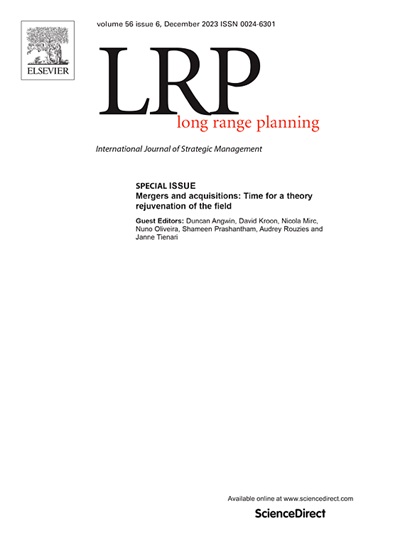Strategies for addressing customers’ adaptation problems in the healthcare ecosystem
IF 6.3
2区 管理学
Q1 BUSINESS
引用次数: 0
Abstract
This study investigates how an innovating firm can address adaptation problems encountered within an existing ecosystem without a central orchestrator. Lacking control over key interdependencies between customers and other actors, such firms must make strategic choices about how to address adaptation problems. Drawing on an in-depth qualitative study of the commercialization process of three innovations within an incumbent healthcare firm, we find that customer adoption was particularly hampered by existing interdependencies between customers and IT system providers and insurers. We identify three strategies—delegating, attuning, and facilitating—that firms use to tackle customer adaptation problems. Each strategy involves distinct trade-offs between control, learning, and cost, and their selection depends on both internal resource fit and external conditions. We discuss implications of our findings for the governance and problem-focused capabilities of firms innovating within established ecosystems.
解决医疗保健生态系统中客户适应问题的策略
本研究探讨了创新型企业如何在没有中央协调者的情况下解决现有生态系统中遇到的适应问题。由于缺乏对客户和其他参与者之间关键的相互依赖关系的控制,这些公司必须就如何解决适应问题做出战略选择。通过对现有医疗保健公司内三种创新的商业化过程进行深入的定性研究,我们发现客户采用特别受到客户与IT系统提供商和保险公司之间现有相互依赖关系的阻碍。我们确定了公司用来解决客户适应问题的三种策略——授权、调整和促进。每种策略都涉及控制、学习和成本之间的不同权衡,它们的选择取决于内部资源适合度和外部条件。我们讨论了我们的发现对治理和企业在既定生态系统中创新的问题聚焦能力的影响。
本文章由计算机程序翻译,如有差异,请以英文原文为准。
求助全文
约1分钟内获得全文
求助全文
来源期刊

Long Range Planning
Multiple-
CiteScore
13.00
自引率
7.10%
发文量
75
期刊介绍:
Long Range Planning (LRP) is an internationally renowned journal specializing in the field of strategic management. Since its establishment in 1968, the journal has consistently published original research, garnering a strong reputation among academics. LRP actively encourages the submission of articles that involve empirical research and theoretical perspectives, including studies that provide critical assessments and analysis of the current state of knowledge in crucial strategic areas. The primary user base of LRP primarily comprises individuals from academic backgrounds, with the journal playing a dual role within this community. Firstly, it serves as a platform for the dissemination of research findings among academic researchers. Secondly, it serves as a channel for the transmission of ideas that can be effectively utilized in educational settings. The articles published in LRP cater to a diverse audience, including practicing managers and students in professional programs. While some articles may focus on practical applications, others may primarily target academic researchers. LRP adopts an inclusive approach to empirical research, accepting studies that draw on various methodologies such as primary survey data, archival data, case studies, and recognized approaches to data collection.
 求助内容:
求助内容: 应助结果提醒方式:
应助结果提醒方式:


